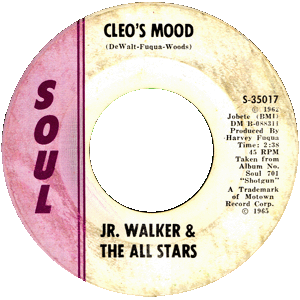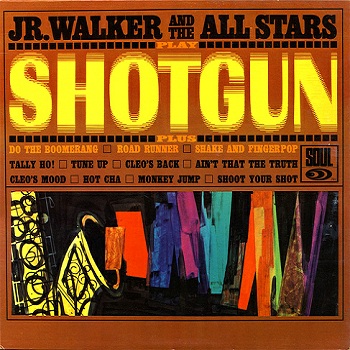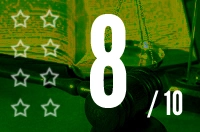Tags
 Soul S 35017 (A), December 1965
Soul S 35017 (A), December 1965
b/w Baby You Know You Ain’t Right
(Written by Autry DeWalt Jr., Harvey Fuqua and Willie Woods)
 Tamla Motown TMG 550 (A), February 1966
Tamla Motown TMG 550 (A), February 1966
b/w Baby You Know You Ain’t Right
(Released in the UK under license through EMI/Tamla Motown)
 Junior Walker has a habit of popping up right when he’s needed, just as things have looked in danger of getting a bit whitebread in the Motown kitchen. Here he is now, saving us from the engorged excesses of Tony Martin’s horrible Ask Any Man; indeed, given that both of these singles came out on the same day, I’m tempted to applaud the compilers of The Complete Motown Singles for their decision to sequence this one after that one, a down and dirty little palate-cleanser.
Junior Walker has a habit of popping up right when he’s needed, just as things have looked in danger of getting a bit whitebread in the Motown kitchen. Here he is now, saving us from the engorged excesses of Tony Martin’s horrible Ask Any Man; indeed, given that both of these singles came out on the same day, I’m tempted to applaud the compilers of The Complete Motown Singles for their decision to sequence this one after that one, a down and dirty little palate-cleanser.
The All Stars, permanent outsiders at Motown (by virtue of their being completely different from most of their labelmates, more than anything else) hadn’t had a single in six months, and when a “new” Junior Walker 45 did appear, some observers might have been surprised to see it was actually a reissue of a three-year-old single originally released on the Harvey label back in 1962 (acquired in the deal that brought both the All Stars and their back catalogue to Hitsville). In fact, Motown had intended to bring Junior back to the fray with something new: I’m A Road Runner, a fresh new recording written and produced by none other than the super-hot Holland-Dozier-Holland team in an attempt to bridge that gap to a more mainstream audience. A catalogue number was allocated, promos were even ordered… and then a funny thing happened.
Cleo’s Back, a speculative new continuation of the Cleo’s Mood concept, recorded for the Shotgun album and then used as a flip to back up the All Stars’ previous single, the excellent Shake And Fingerpop, started to pick up airplay on black stations across the country. The momentum grew and grew, and suddenly Cleo’s Back had supplanted Fingerpop on the soul charts; the scuzzy funk groove outpowering the upbeat R&B jam. Never slow to react, Motown moved to push I’m A Road Runner onto the back burner, and to promote the three-year-old Cleo’s Mood as the new single in its place. Which officially brings us up to speed: to the end of December 1965, and the last single Motown would release before Christmas.
I’ve talked before (at length!) on this blog about how Junior Walker and the All Stars represented something intangibly special for Motown; more than simply calling them a way for Berry Gordy to reconnect with the company’s original audiences, with the label’s supporters in black radio, with Motown’s roots, it’s about reminding the world (and perhaps Gordy himself) that crossing over to new fans (who might want more Tony Martin style records) didn’t mean abandoning old fans, didn’t mean surrendering the battle not just for popularity but for relevance over the soul station airwaves to the likes of Stax or Atlantic.
Nowhere is that concept more in evidence than here; why else would a label like Motown – ostensibly so obsessed with its image and with R&B pop perfection – sideline a new cut from its most dependable hitmakers and standard-bearers in favour of a three-year-old R&B jazz single that had literally nothing in common with what was going on all around? The answer is in the question: because it was different. Because it reminded everybody – DJs and punters alike – that Motown, in this banner year, wasn’t just about girl groups and boy groups and heartache and beauty, that there was still a residue of grime and chitlins lurking in the label’s DNA after all. You think we’ve sold out, you think Tony Martin represents some sort of aphelion, that Motown is now as far away from our roots as it’s possible to get without us actually signing Bing Crosby (and deep down you know we would if we could)? Well, get a load of this, then. Our next record is a three-year old jazz-funk instrumental, the inspiration for the one you liked last time out, a hangover from some atavistic live jam at some semi-mythical run-down greasy pig’s feet kind of blues joint.
 I’m interested in knowing what the group themselves thought about all of this, and in particular how they felt seeing a new cut sidelined in favour of a much older one – especially as, for me anyway, the three-year-old take on the concept is actually better than the more recent one presented in Cleo’s Back. Hearing this on the radio again (assuming it got any airplay the first time around) might have been an interesting experience for Walker and his pals.
I’m interested in knowing what the group themselves thought about all of this, and in particular how they felt seeing a new cut sidelined in favour of a much older one – especially as, for me anyway, the three-year-old take on the concept is actually better than the more recent one presented in Cleo’s Back. Hearing this on the radio again (assuming it got any airplay the first time around) might have been an interesting experience for Walker and his pals.
As I said when we were reviewing Cleo’s Back, this is effectively the same song in a different arrangement, and it’s the cooler and more fluid and ultimately more interesting of the two. Initially, it’s driven along not just by Junior’s ferocious sax (athough he’s on fine form here), but also by the squalling keyboard part that opens the track with a piercing shriek before settling into an irresistible Morse Code riff buried in the mix, and by a bass drum that feels like someone’s punching you in the chest with each bar. When the keyboard takes over for a thrilling organ solo (three words I don’t usually expect to see together), it’s everything that Earl Van Dyke’s recent keyboard overdubs should have been and never could be; it swings.
Junior’s sax comes back, and there’s a kind of bitter sadness about it, the sound of rain on a windshield making the horn cry real tears for a moment, and for that moment the rest of the Motown story has fallen away, and with it Junior Walker’s part in that narrative; it’s as if, for a few seconds, this is the Motown Sound. For sure I’m no longer instinctively put off by saxophones; I freely admit this sends shivers down my spine.
It can’t last, of course, the bewitching spell breaking even as it’s being cast, and we’re reminded that we’re listening to a three-year-old jazz instrumental being passed off as a Motown single on the cusp of 1966; that however thrilling parts of this may be, it’s maybe more of a groove than a fully-fledged record, an idea, a concept to be readily picked up after three years as if nothing had changed, and thus to be pressed into service as a belated sequel to itself, forever to be heard in the light of the unlikely radio hit it had spawned. Plus, there’s something missing from it which is present on the best All Stars sides we’ve heard so far, some kind of X factor (possibly Junior’s own vocals, now that I come to think of it), which I keep half-expecting to hear even though I don’t know what it is.
But there’s a curious and agreeable aptness seeing this turn up as a Motown A-side in the middle of the company’s mid-Sixties Golden Age, rounding off Motown’s biggest year yet (and we’re still not done – we’ve got perhaps the greatest single week in Motown history still to come before we reach the New Year). I don’t want to keep giving everything 8 or 9, but when the quality threshold is this high it’s better just to go with the flow; almost everything on a Motown A-side is great right now, even the stuff that was recorded years before. Berry Gordy was vindicated again, the record both gaining plenty of new fans, and selling relatively well (not quite as big a hit as Cleo’s Back but just missing the top 10 for soul); people bought it and people played it, and I find that heartening. Certainly I like this a lot more than I might once have expected to. Merry Christmas.
MOTOWN JUNKIES VERDICT
(I’ve had MY say, now it’s your turn. Agree? Disagree? Leave a comment, or click the thumbs at the bottom there. Dissent is encouraged!)
You’re reading Motown Junkies, an attempt to review every Motown A- and B-side ever released. Click on the “previous” and “next” buttons below to go back and forth through the catalogue, or visit the Master Index for a full list of reviews so far.
(Or maybe you’re only interested in Jr. Walker & the All Stars? Click for more.)
 |
 |
| Tony Martin “Spanish Rose” |
Jr. Walker & the All Stars “Baby You Know You Ain’t Right” |
DISCOVERING MOTOWN |
|---|
Like the blog? Listen to our radio show! |
| Motown Junkies presents the finest Motown cuts, big hits and hard to find classics. Listen to all past episodes here. |


It was a bit of a surprise when I first heard this back in February 1966 on TMG 550. My introduction to Jr had been less than a year earlier with “Shotgun’ then ‘Boomerang’ and ‘Finger pop’, so this slower and less commercial item sounded a bit odd to me. I had no idea at the time it was an older recording, although it sounded a bit dated to me, as the UK label stated c.1965. It took a long time to grow on me, in fact it wasn’t until well into the 1970s that I really started to consider it something of a classic instrumental. Now I thoroughly enjoy listening to it. It has a lovely melody, and really lives up to its title, ie moody. Same mark from me as your review. The brilliance of Harvey Fuqua comes to the surface yet again.
LikeLiked by 1 person
After listening to both “Cleos” back-to-back, I’d have to give a slight edge to “Back” (8) over “Mood” (7). The guitar work during the former is especially funky. Here’s the link so that you can decide for yourselves:
(Can’t wait for Mr. Nixon’s analysis of the temporarily-shelved “(I’m A) Road Runner. ” It’s very, very high on my list!
LikeLiked by 1 person
Back at the time this was released, I don’t think it struck most people as a 3 year old track. It sure didn’t sound like that to me (but then again I was a relatively naive 14 year old living in upstate New York). It was the new Jr. Walker single. I knew Cleo’s Back and this sounded like the follow up to me. I really liked it! Had that nice smoky groove.
However, I didn’t realize that Road Runner was scheduled earlier. It’s my favorite Jr. Walker track and is one of my all-time favorite Motown records (one of my 10s). I think they were right in seizing the moment and re-releasing Cleo’s Mood. By doing so it made the Shotgun album practically a greatest hits collection for Mr. Walker. (But I never bought the album at the time.)
LikeLiked by 1 person
Back then, everything after “Going To A Go Go” felt like a 1966 record, this and “Darling Baby” included. I think it’s smartly sequenced on the Shotgun album, side 1, track 1 as a hor dourve before you get to hear Walker sing anything. Of course, the real opening bell of 1966 would be Martha leaving all pretense of any teen concerns far, far behind.
Like most great instrumentals, it doesn’t allow much comparison with this or that era of Walker’s career: it’s not like the difference between the youngster Marvelettes of “Beechwood” as opposed to the mature women of “Hunter”; or the kid Stevie Wonder of “Fingertips” to the confident man of “Signed, Sealed, Delivered.” “Cleo’s Mood” didn’t feel three years old when this single was belatedly making itself heard, and it doesn’t feel old now.
It’s another Walker record, much like “Walk In The Night,” that feels absolutely made for some dialogue-free, driving montage in a cop or detective movie. It wasn’t quite used that cleverly in 1975’s “Cooley High” but it is in that movie and soundtrack.
Of course, I love “Cleo’s Mood,” and an 8 is great. And waiting till March doesn’t hurt “Road Runner” a bit. 🙂
LikeLike
I had bought the Harvey release, so this was a re-issue to me. I always liked it. But I like Cleo’s Back better. I’d give this an 8.
LikeLike
NIce little tune. I have an interesting history with Jr Walker. The first song I ever heard by him was “Shoot Your Shot” which was interestingly released 2 years later off the SHOTGUN album. Didn’t buy the single when it came out but picked it up a few years later in one of those 3 for $1 bins (where I got many Motown & other soul singles). I remember when the HOME COOKIN album came out. I knew a few of the tracks (“Come See About Me” “Hip City”) & picked up the album. I was about 11 years old & still discovering Motown. I remember hearing “What Does It Take” on the album. At that point it hadn’t been released as a single. I thought it was kind of cool hearing it on the radio a month or 2 later. I think that was the first instance of buying an album before a song got released as a single. A few years ago I was browsing in a USED CD store & saw the SHOTGUN CD for about $6 & didn’t pick it up! Don’t ask me why? Oh well, I have most of the selections from it in my collection.
LikeLike
WordPress is having one of its habitual stupid break-everything redesigns behind the scenes, so another wait might ensue. Also, if people are having trouble commenting please let me know. (probably by email I suppose). Sorry for any inconvenience.
LikeLike
I know you said not to ask why…but…Shotgun for $6 bucks and you didnt pick it up? WHY????
LikeLike
I can top that. 1970. Christmas shopping with my best buddy and his mom in Philadelphia on Kensington Avenue. I’m 16. We’re in the kind of dive of department store (concrete floors) where you can walk around with a lit cigarette, which Sam’s mom did. There in record department, for only a buck each are two mint-condition, original 1963 RCA pressings of “Heat Wave” without even oldies drill holes in them.
This idiot bought one.
I’ve still got it, I keep it in very reverent shape, but I kick myself remembering my half-wisdom.
LikeLike
I’m a little late here, but I wanted to applaud your tasty analysis of this very tasty song – the timing is particularly apt for me, as I’m about to embark on another sax piece, this one for sax, soprano and piano – and it’s good to know that your saxophobia can be breached! It was very bracing to renew my acquaintance with Cleo – and with the wonderful (yes, thrilling) organ break. I agree with the 8, but I don’t feel anything’s missing – the song is a little jewel, a funky little jewel, and quite perfect. As is your piece. Looking forward to 1966, and the Supremes! Happy New Year!
LikeLike